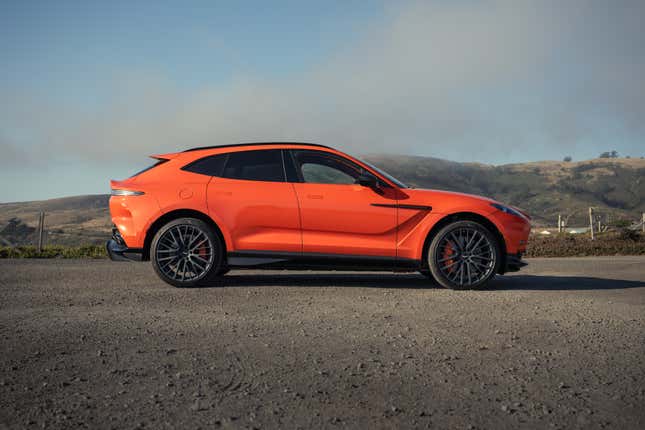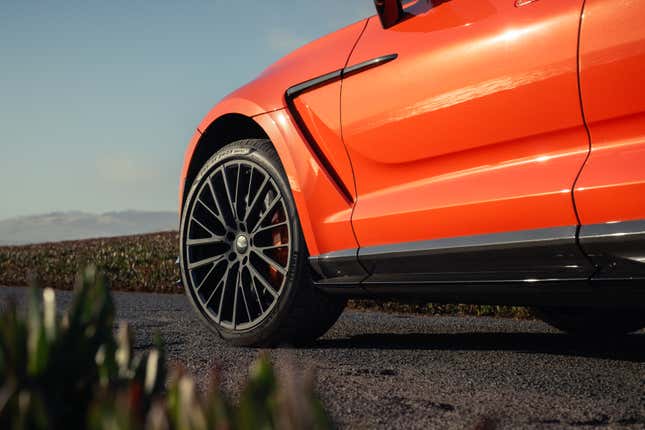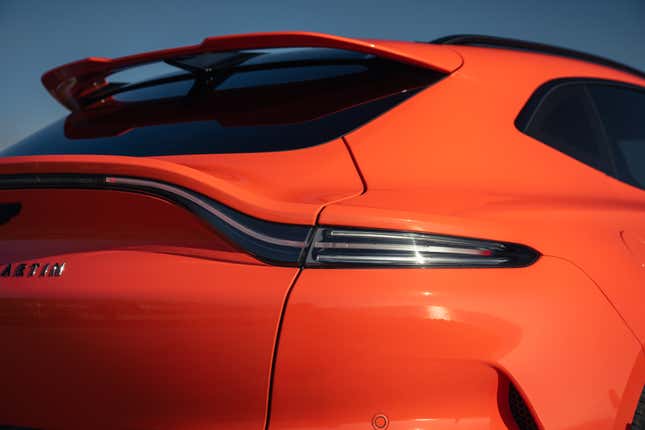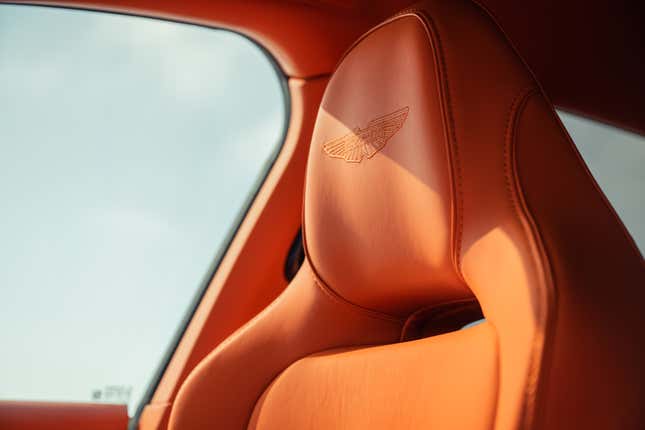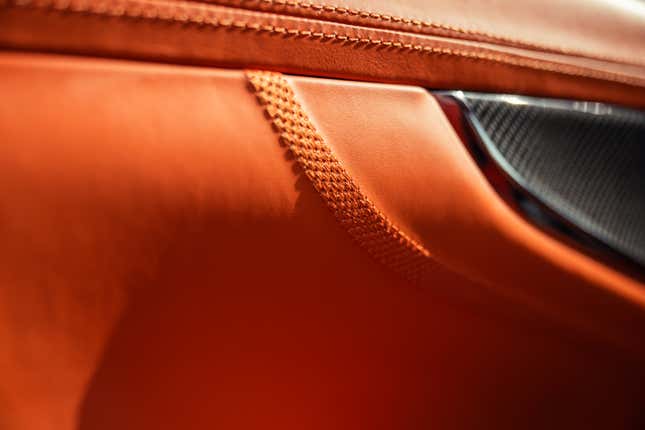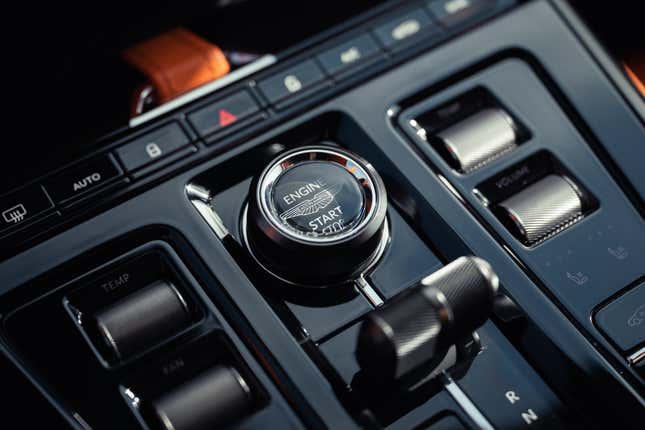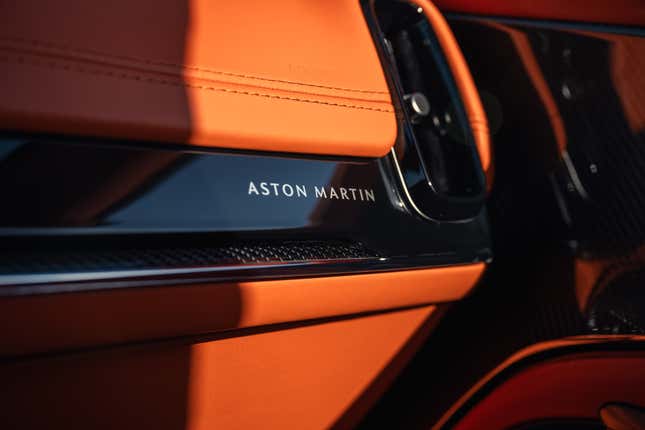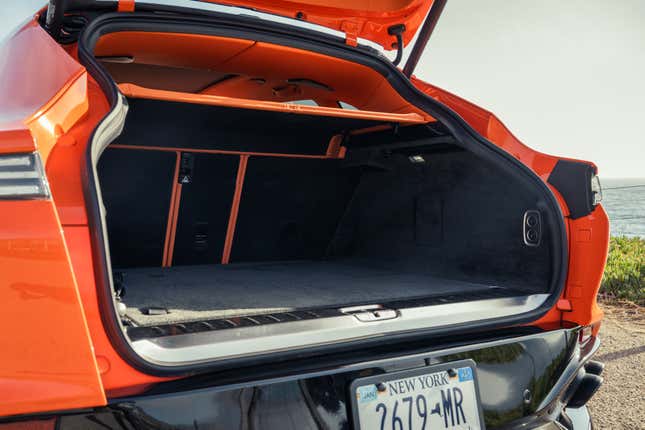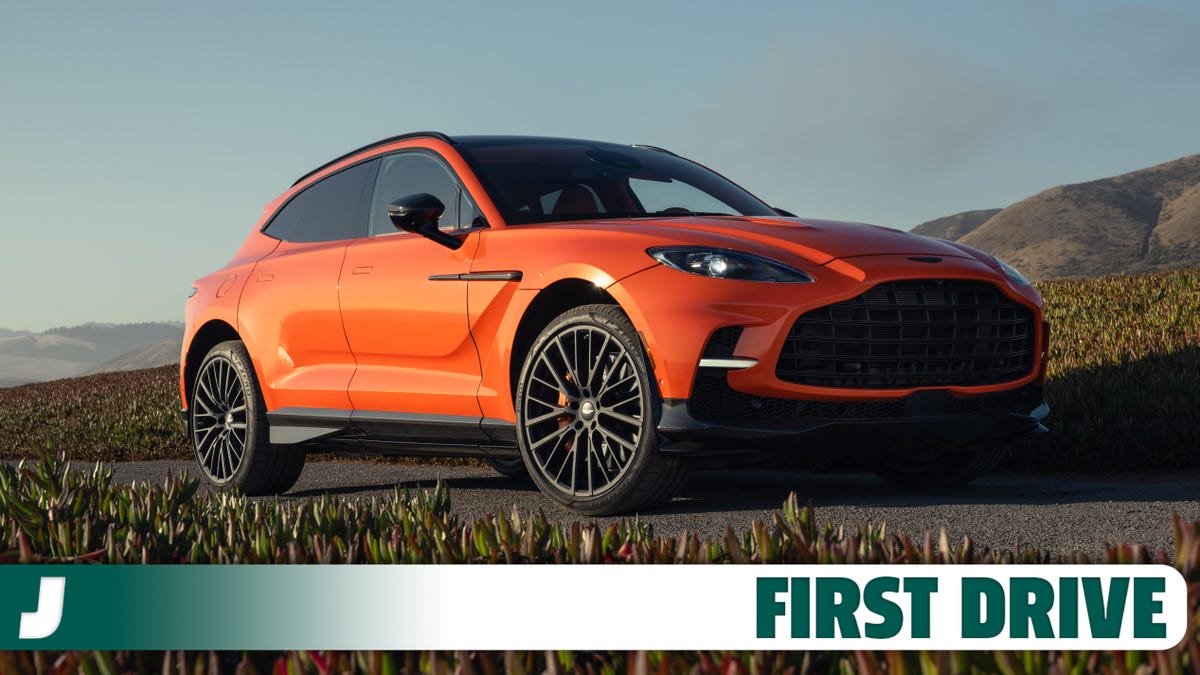When Aston Martin launched its first SUV in 2020, the DBX was gorgeous, great to drive and full of promise, but it felt half-baked. The DBX’s relative lack of performance compared to its peers was rectified in 2022 with the DBX707, a new variant that increased engine output to nearly 700 horsepower and overhauled the SUV’s dynamics. When it came to performance, the DBX could truly compete with the Lamborghini Uruses and Porsche Cayenne Turbo GTs of the world.
Except, the DBX707 was still saddled with an interior that looked beautiful but was infuriating to live with, mainly due to its touchscreen-less infotainment system, strange buttons and poor ergonomics. If the normal DBX was Charmander, the DBX707 was Charmeleon — stronger and more aggressive, but still not fully formed. Now, for 2025, the DBX707 has finally evolved into Charizard thanks to a total interior overhaul and a number of other enhancements.
Full disclosure: Aston Martin flew me up to Northern California to drive the DBX707 around Napa. I was put up in a nice hotel for a night and was fed great food. I’ve been obsessed with Coop’s Collection on TikTok, thus the Pokémon reference that was also spurred by the orange and red DBX707s that were at the launch.
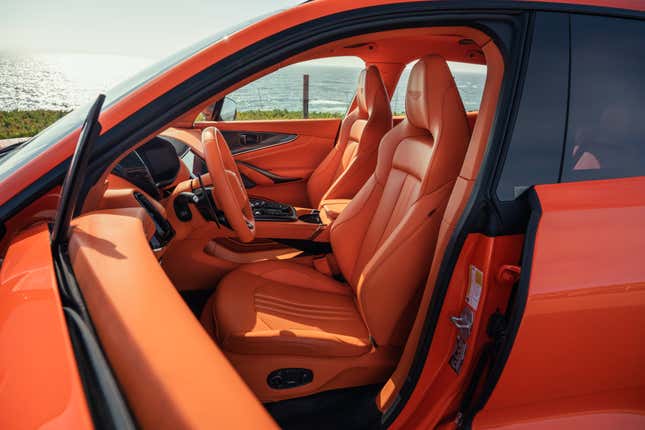
The DBX707 is now the only way to get a DBX, as Aston dropped the standard trim. While that’s a shame, as I prefer the less-aggressive styling of the base DBX, I understand the decision. It was pointless of Aston to try and compete with SUVs in the $150,000-ish range where the DBX originally landed; there’s less competition once you reach the 2025 DBX707’s $253,000 starting price (including destination) and higher power level. And unlike last year’s model, the updated DBX707 feels genuinely worth that pricetag once you step inside.
But before you get in, you’ll experience one of the DBX707’s most welcome updates. Aside from a reworked rear spoiler and even more color and wheel options, the exterior design is exactly the same as before. That’s fine, as it remains one of the best looking SUVs out there. It’s the door handles that are the big upgrade. While they look the same as the old ones, the flush door handles are now powered, popping out when the car is unlocked or you walk up to it. This is a welcome change from the previous model years where you had to physically press on the stick-like handle and then keep a good grip on it to be able to pull the door open, which was especially annoying if you were carrying a bunch of stuff.
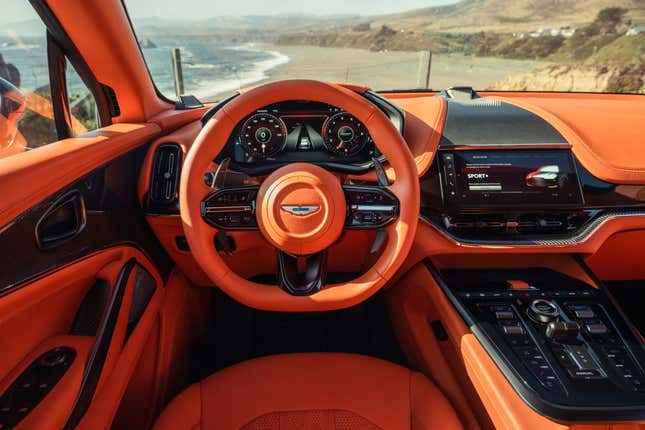
Much of the DBX’s updated cabin components are shared with the DB12, the comprehensive facelift to the DB11, but the DBX’s dashboard, center console and door card designs are all its own, and totally redesigned compared to last year’s model. Centered in the dashboard is a new 10.3-inch infotainment screen that is finally touch-operated, ditching the old Mercedes Comand–derived system with a rotary knob and button array. Its totally new software is an in-house Aston development that is way better than the generations-old Benz stuff, with cool graphics and fairly straightforward menus.
Sure, some of the settings are confusing, some of the buttons and toggles are too small, and sometimes everything is hard to read, but a lot of the system’s issues could be easily fixed with future software updates. You also get wireless Apple CarPlay and Android Auto, which were especially annoying to use before the screen could be touched, and there are a bunch of USB-C ports throughout the interior. The 12.3-inch gauge cluster is larger than the ones in the DB12 and Vantage, and it has new graphics too. Aston seriously improved the 360-degree camera quality, the car is available with more advanced driver-assist features, and you can get a new 23-speaker Bowers & Wilkins surround sound system that is pretty awesome (and costs $12,300).
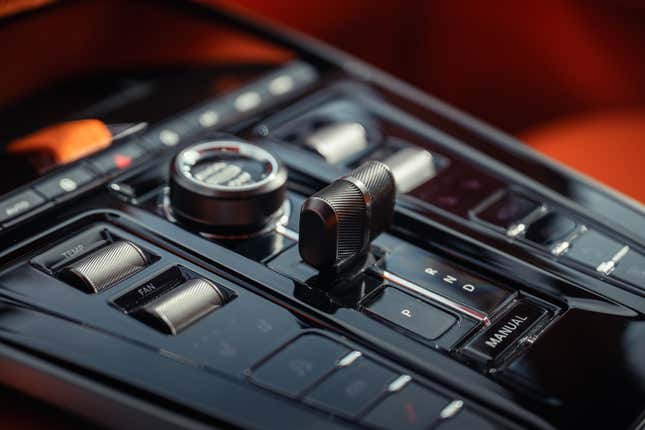
You no longer shift gears by pressing buttons set at a far reach above the screen; instead, the updated DBX has a chunky metal toggle shifter in the center console, set right behind a new start/stop button that doubles as the drive mode selector. There are four barrel-shaped knobs for the volume, temperature and fan speed, plus a row of buttons for stuff like the windshield heater and recirculation, though most of the climate controls are accomplished through an infotainment page that’s easy to bring up. Further back on the console are a bunch more hard buttons for performance features like the exhaust and suspension. All of the new controls feel nice to use, especially the hefty drive mode dial.
Aston’s designers did a better job utilizing the surprising amount of cabin space, with larger storage cubbies, a repositioned wireless charging pad and better cupholders, plus a new open area underneath the center console. The seats are super supportive, and even with the sloping roofline there’s plenty of head- and legroom in the back seat. The new interior has a more liberal use of cosmetic trim pieces made from aluminum or carbon fiber or wood, beautiful contrast stitching and piping patterns, and color-matched leather on more surfaces (if you pay up for it). Also new are the air vents, door handle pulls, speaker grilles and other details. Overall quality feels improved, both in terms of materials and how it’s all put together.
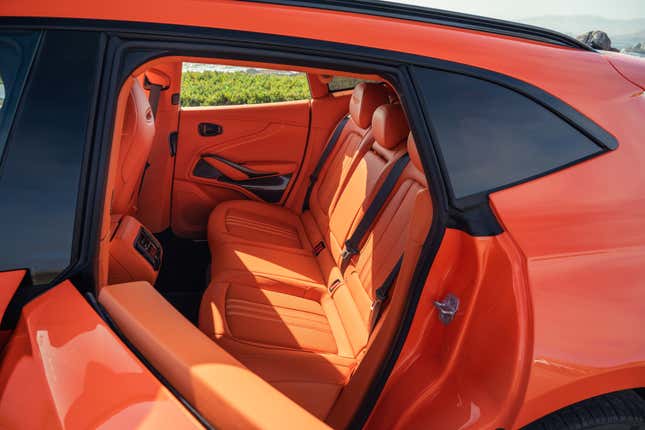
There are still some annoyances. Aston continues to use the same fiddly, inscrutable seat and mirror controls, and the seat heating and ventilation is accomplished through small touch-capacitive buttons. The steering wheel itself is much better than the old one, and some of its controls are satisfying, but the thumb pads are even harder to use than in the Mercedes they come from, making it annoying to scroll through the various gauge cluster menus. The sun visors also suck, as they’re too small and fiddly..
To experience more than just the new interior, Aston let us loose in the DBX707 on some of the best mountain roads that California’s wine country has to offer, the sort of route that would typically be reserved for a high-performance sports car, not a tall-riding SUV. The DBX707’s AMG-derived twin-turbo 4.0-liter V8 puts out the same 697 horsepower and 664 pound-feet of torque as before, and it still sounds awesome. Its snarling exhaust note is distinct from the AMGs, more bellowing and bass-heavy with natural pops and bangs on overrun and shifts. A 9-speed wet clutch automatic transmission distributes torque to all four wheels (with up to 100 percent of that torque able to be sent to just the rear axle), and Aston says the DBX707 will hit 60 mph in just 3.1 seconds. Mid-range acceleration is no joke, no matter the gear or drive mode you’re in, and the transmission’s shifts are well-tuned, always coming fast and smooth. Roll onto the throttle and the DBX delivers an effortless surge of power, and in Sport+ mode there’s an enhanced feeling of urgency from the powertrain.
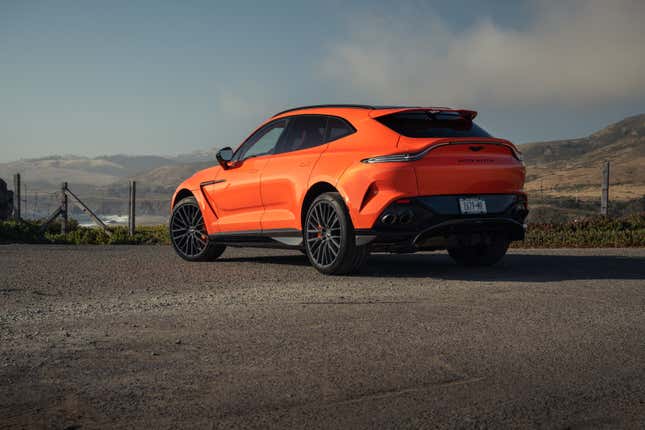
Curiously, it’s in the middle Sport mode where the DBX707 is quickest around a track or your local canyon road, where Sport+ is more about driving enjoyment instead of outright “good” dynamics, and a lot of that is down to the chassis setup. Three-chamber air springs with electronically adaptive dampers and a 48-volt active anti-roll system are standard, and Aston’s engineers retuned the systems to provide a greater mix of comfort and performance. In Sport+ everything is less buttoned down; there’s a wider gap between compression and rebound, which gives the feeling that the car is floatier and moving around more over bumps and in corners, but not in an uncontrollable way. That extra floatiness helps keep all four tires in contact with the ground, and as the driver I feel more in-tune with how the car is moving dynamically, versus it just being flat and precise all the time. As I enter a corner the nose stiffens up while the rear end loosens for easier rotation, then the rear progressively stiffens up as the front softens to give the sensation of roll-on oversteer. With the more rear-biased torque setup in Sport+, it’s easy to kick the DBX707’s tail out if you want. Of course, you can separately select between the three settings for the engine, exhaust and chassis to dial in your favorite setup.
Gigantic carbon-ceramic brakes are standard, and they do an excellent job of bringing the 4,940-pound DBX707 to a stop without any fade or squeaking. Pedal feel is pretty linear, with less of an aggressive tip-in than most other cars with carbon brakes. 22-inch wheels are standard but the DBX I’m driving is equipped with a $7,200 set of 23s wearing Pirelli P Zero summer tires that provide tons of grip but a choppy ride on rougher pavement. The thick-rimmed steering wheel (that’s no longer weirdly shaped) relays a lot more feedback than is typical of an SUV, with a direct and quick rack.
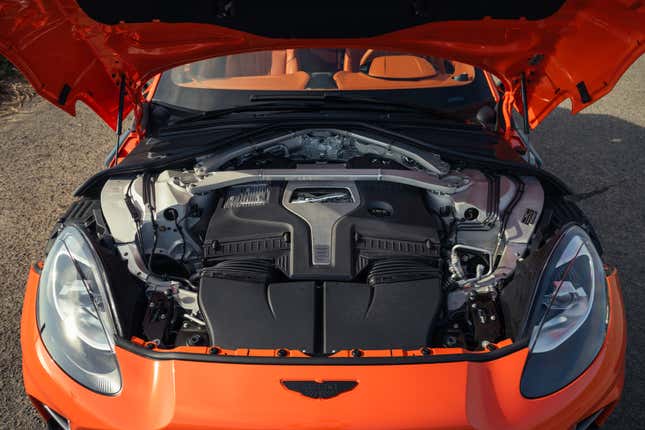
The DBX707 is wonderfully playful, fast as hell and a lovely place to spend time. You’re really gonna pay up for the privilege, though. Yeah, I know I said it starts at $253,000, but that’s very much a starting point. All the DBX707s at the launch had MSRPs of at least $340,000 after options; the most expensive was $352,200. Options include $10,800 for carbon bits on the upper half of the exterior and $19,500 for carbon on the lower half, fancy paint jobs for $13,600, smoked taillights that cost $1,500, an interior scheme that starts at $11,900 with $3,100 Alcantara headliner and $6,400 leather color on top of that… The lists go on.
That price scale is about what you can expect from a Bentley Bentayga or a Lamborghini Urus, though, and the DBX feels more special than either. The Porsche Cayenne Turbo GT is cheaper and the better overall performance vehicle, but it’s not as entertaining as the Aston. And Ferrari’s V12-powered Purosangue doesn’t even start until $400K. Now that the DBX707 has reached its final evolution, it can take a deserving stand-out spot in the super-SUV realm.
